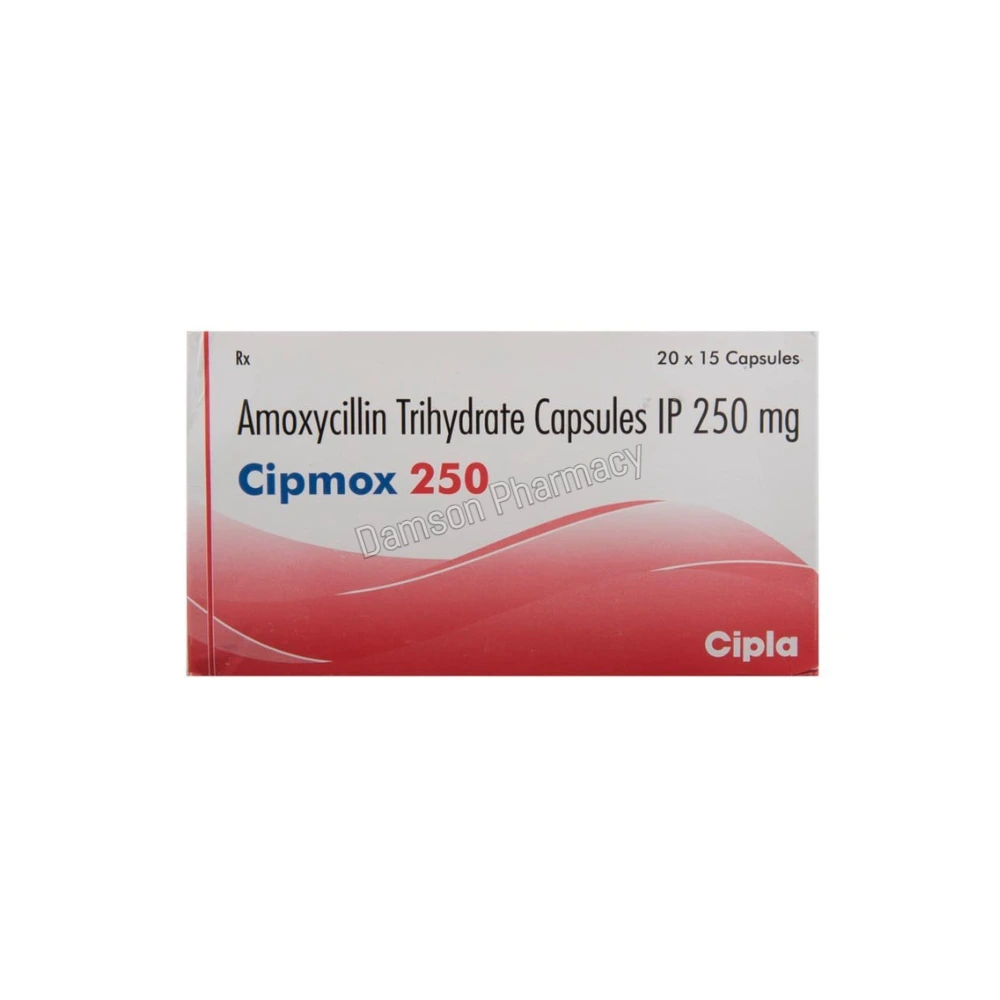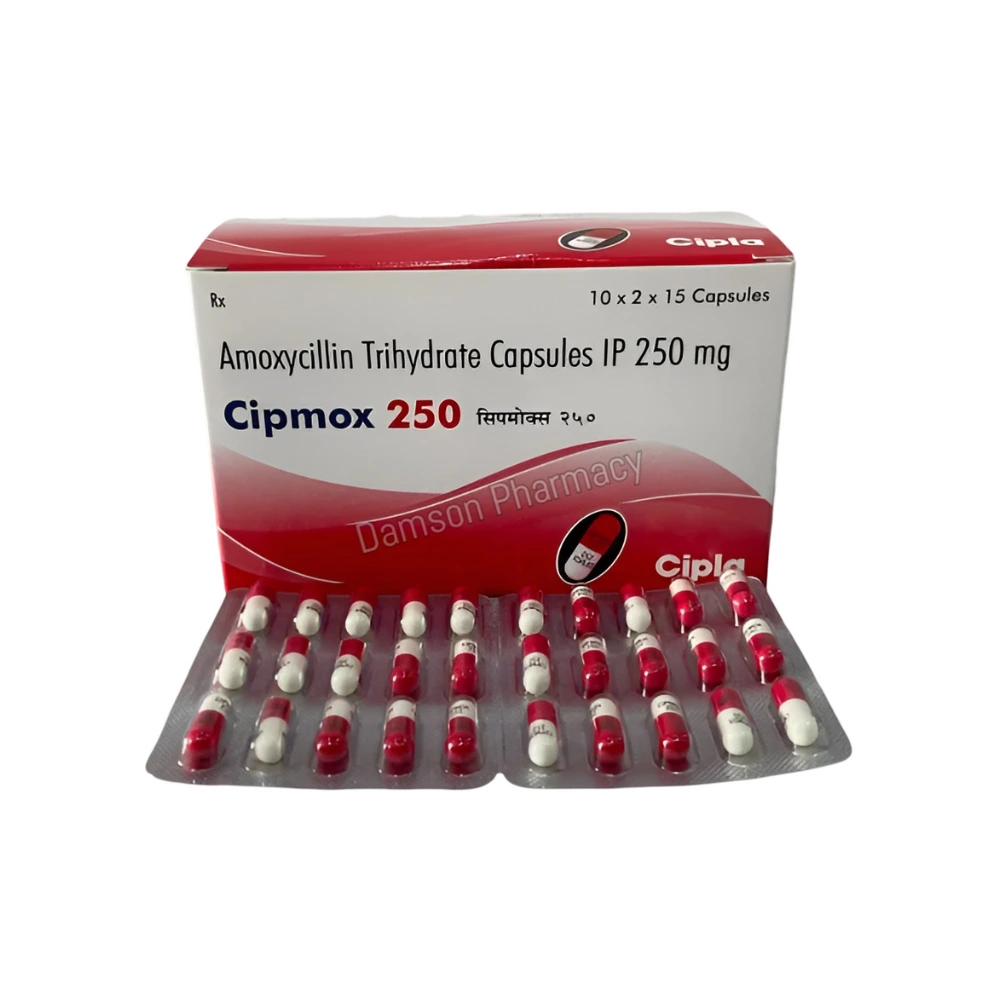Cipmox 250mg Amoxycillin Capsules
$45.00 – $175.00Price range: $45.00 through $175.00
| Pack Size | Price | Price / Unit | Quantity | |
|---|---|---|---|---|
| 100 Capsules | $45.00 | $0.45/ unit | ||
| 300 Capsules | $80.00 | $0.27/ unit | ||
| 500 Capsules | $175.00 | $0.35/ unit |
Looking for bulk / B2B pricing? | Send Inquiry |

| SKU | 11481 |
| Manufacturer | Cipla Limited |
| Categories | Infection |
| Delivery Time | 10 - 14 Working Days |
| Strength | 250mg |
Introduction to Cipmox 250mg Amoxycillin Capsules
Cipmox 250mg capsules are prescribed for the treatment of a variety of bacterial infections caused by susceptible strains of bacteria. Some common infections that may be treated with amoxicillin include respiratory tract infections, urinary tract infections, skin and soft tissue infections, and certain types of bacterial meningitis.
Cipmox 250mg can be taken with or without food, and at the same time every day to ensure its better efficacy. Take the capsule as a whole without crushing or breaking it. Make sure that the course of antibiotic treatment is completed as directed by your doctor. Do not stop taking Cipmox 250mg Capsule on your own even if you feel better.
Cipmox 250mg can interact with other medicines. Inform your doctor if you are taking any medicines before starting the treatment with this capsule. Inform your doctor if you are pregnant, planning a pregnancy or are breastfeeding before taking Cipmox 250mg Capsule.
Uses of Cipmox 250mg
Cipmox 250mg contains amoxicillin, a broad-spectrum penicillin antibiotic used to treat various bacterial infections. It is commonly prescribed in lower doses like 250mg for children or for milder infections. Here are the main uses of Cipmox 250mg:
- Respiratory Tract Infections
- Ear Infections (Otitis Media)
- Urinary Tract Infections (UTIs)
- Skin and Soft Tissue Infections
- Dental Infections
- Helicobacter pylori Eradication (as part of combination therapy)
How Does Cipmox 250 mg Capsules Works?
Cipmox 250mg capsules contain amoxicillin, which is a penicillin-type antibiotic that works by inhibiting the formation of bacterial cell walls. Bacteria need strong cell walls to survive, and amoxicillin blocks the enzymes involved in building these walls.
As a result, the bacteria become weak and burst open, effectively killing them and stopping the infection. Amoxicillin is considered a broad-spectrum antibiotic, meaning it can target a wide range of bacteria. It is effective against both gram-positive and some gram-negative bacteria.
By stopping the growth and multiplication of these harmful bacteria, Cipmox helps the body’s immune system clear the infection more quickly and effectively.
Side Effects of Cipmox 250
Common Side Effects
- Gastrointestinal Distress
- Skin Reactions
- Allergic Reactions
- Oral and Vaginal Yeast Infections
- Hypersensitivity Reactions
- Stomach Upset
- Changes in Blood Counts
Serious Side Effects
- Severe Skin Reactions
- Severe Diarrhea or Persistent Gastrointestinal Distress
- Liver Problems
- Blood Disorders
- Renal (Kidney) Dysfunction
- Clostridium difficile Infection
Dosage of Cipmox
Manufacturer
Cipmox 250mg and Cipmox 500mg capsules are manufactured by Cipla Ltd, a well-known Indian pharmaceutical company. Cipla is recognized globally for producing high-quality, affordable medicines across a wide range of therapeutic areas, including antibiotics like amoxicillin.
Cipla was founded in 1935 by Dr. Khwaja Abdul Hamied, a visionary scientist and entrepreneur who aimed to make essential medicines affordable and accessible in India. Over the decades, Cipla has grown into a global pharmaceutical leader, known for its commitment to innovation and public health.
Warnings & Precautions
Cipmox 250mg (Amoxicillin) capsules, like any medication, come with certain warnings and precautions to ensure safe and effective use. It’s important for individuals to be aware of these and follow the guidance of their healthcare provider. Here are some general warnings and precautions associated with Cipmox 250mg capsules:
1. Allergic Reactions:
- Inform your healthcare provider of any known allergies to amoxicillin, other antibiotics, or any other substances.
- If you have a history of severe allergic reactions (anaphylaxis) to penicillins or cephalosporins, let your healthcare provider know.
2. Serious Skin Reactions:
- Contact your healthcare provider immediately if you develop severe skin reactions, including blistering or peeling. Discontinue the medication if severe skin reactions occur.
3. Clostridium difficile-Associated Diarrhea:
- Antibiotic use, including amoxicillin, can lead to the overgrowth of Clostridium difficile bacteria, causing severe diarrhea and colitis. Contact your healthcare provider if persistent diarrhea occurs.
4. Renal Impairment:
- Individuals with impaired kidney function may require dosage adjustments. Inform your healthcare provider if you have kidney problems.
5. Pregnancy and Breastfeeding:
- Inform your healthcare provider if you are pregnant, planning to become pregnant, or breastfeeding. Amoxicillin is generally considered safe during pregnancy and breastfeeding, but your healthcare provider will assess the benefits and risks.
6. Drug Interactions:
- Provide a complete list of all medications, supplements, and herbal products you are taking to avoid potential drug interactions.
7. Resistance and Incomplete Treatment:
- Take the full course of antibiotics as prescribed, even if symptoms improve before the medication is finished. Failure to complete the course may contribute to the development of antibiotic-resistant bacteria.
8. Pediatric Considerations:
- Follow pediatric dosing instructions carefully, and consult with a healthcare provider for appropriate use in children.
9. Hypersensitivity Reactions:
- Monitor for signs of hypersensitivity reactions, such as fever, joint pain, and eosinophilia.
Safety Advice
- Complete the Full Course
- Take as Directed
- Stay Hydrated
- Do Not Share Medication
Frequently Asked Questions
1. Can I drink alcohol while taking Cipmox 250mg?
Ans. It is generally advisable to avoid alcohol while taking antibiotics, including amoxicillin, as alcohol can interact with the medication and may increase the risk of side effects.
2. Is Cipmox 250mg safe during pregnancy and breastfeeding?
Ans. It is generally considered safe during pregnancy and breastfeeding, but it’s important to inform your healthcare provider if you are pregnant, planning to become pregnant, or breastfeeding. Your healthcare provider will assess the potential risks and benefits.
3. How should Cipmox 250mg be stored?
Ans. Store Cipmox 250mg capsules as directed on the packaging. Keep them in a cool, dry place, away from direct sunlight and moisture. Follow any specific storage instructions provided.
4. Can I stop taking Amoxicillin 250mg if my symptoms improve before finishing the course?
Ans. No, it’s important to complete the full prescribed course of antibiotics, even if symptoms improve before completion. Stopping the medication prematurely may contribute to antibiotic resistance.
| Pack Size | 100 Capsules, 300 Capsules, 500 Capsules |
|---|---|
| Price/Unit | $0.35/unit, $0.40/unit, $0.45/unit |
Be the first to review “Cipmox 250mg Amoxycillin Capsules” Cancel reply
Related Products
No related Products Found









Reviews
There are no reviews yet.